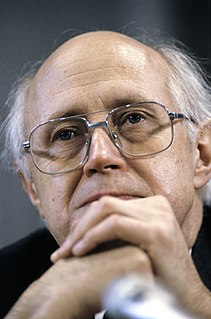A Quote by Michel de Montaigne
There is a plague on Man, the opinion that he knows something.
Related Quotes
It has always been my opinion since I first possessed such a thing as an opinion, that the man who knows only one subject is next tiresome to the man who knows no subject. Therefore, in the course of my life I have taught myself whatever I could, and although I am not an educated man, I am able, I am thankful to say, to have an intelligent interest in most things.
There are four types of men in this world: 1. The man who knows, and knows that he knows; he is wise, so consult him. 2. The man who knows, but doesn't know that he knows; help him not forget what he knows. 3. The man who knows not, and knows that he knows not; teach him. 4. Finally, there is the man who knows not but pretends that he knows; he is a fool, so avoid him.
A man’s ignorance sometimes is not only useful, but beautiful - while his knowledge, so called, is oftentimes worse than useless, besides being ugly. Which is the best man to deal with - he who knows nothing about a subject, and, what is extremely rare, knows that he knows nothing, or he who really knows something about it, but thinks that he knows all?
A man should always have these two rules in readiness. First, to do only what the reason of your ruling and legislating faculties suggest for the service of man. Second, to change your opinion whenever anyone at hand sets you right and unsettles you in an opinion, but this change of opinion should come only because you are persuaded that something is just or to the public advantage, not because it appears pleasant or increases your reputation.
...we all know that in all matters of mere opinion that [every] man is insane-just as insane as we are...we know exactly where to put our finger upon his insanity: it is where his opinion differs from ours....All Democrats are insane, but not one of them knows it. None but the Republicans. All the Republicans are insane, but only the Democrats can perceive it. The rule is perfect: in all matters of opinion our adversaries are insane.
Why does a man cry? he wondered. Not like a woman; not for that. Not for sentiment. A man cries over the loss of something, something alive. A man can cry over a sick animal that he knows won't make it. The death of a child: a man can cry for that. But not because things are sad. A man, he thought, cries not for the future or the past but for the present.







































